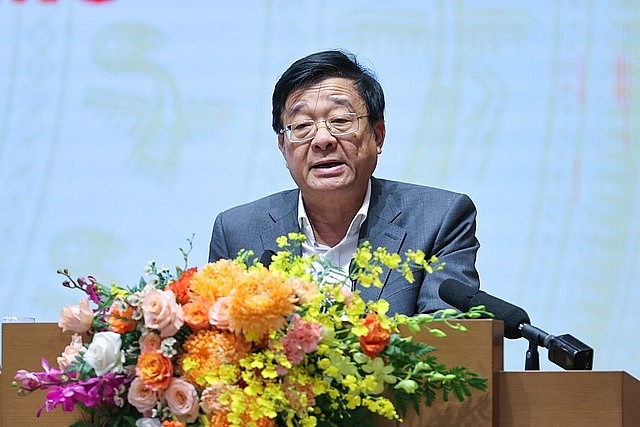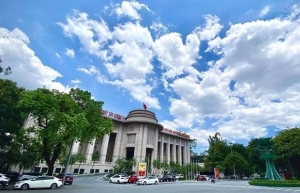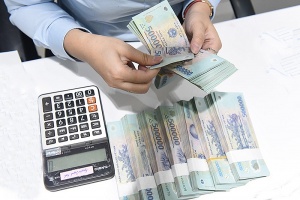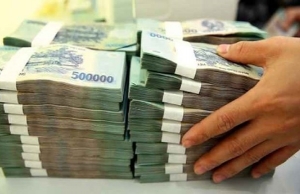Bank credit registers slight fall in first two months
 |
| Nguyen Quoc Hung, general secretary of the Vietnam Banks Association |
At a conference on resolving difficulties for production and business on March 14 chaired by the prime minister, Nguyen Quoc Hung, general secretary of Vietnam Banks Association (VNBA) said that as of the end of February, economic credit decreased by 0.72 per cent on-year.
Of this, the agricultural sector reduced by 0.17 per cent, the construction industry by 0.13 per cent, trade and services by 0.91 per cent, and consumer loans by 1.77 per cent, while real estate credit rose by 0.23 per cent.
"However, low growth in the first months of the year is common" Hung said.
Average credit growth in the first two months of the year in the period 2013-2023 was 0.56 per cent. However, in 2014–2018 and 2024, credit growth rate in the first two months of the year was negative.
The VNBA pointed out several challenges in the banking industry, like difficulties in the capital market. World geopolitical conflicts have disrupted supply chains, and orders have dropped, leading to depleted resources and assets.
The banking industry is struggling with existing bad debt pressure, and the real estate market is quiet, so it is very difficult to handle collateral and bad debt recovery.
Moreover, consumer lending by financial companies faces many difficulties as many borrowers deliberately do not repay their debts, so credit institutions have narrowed their scope and loan objects. High-tech crime fraud and money laundering crimes are increasingly bold and sophisticated.
"The implementation of some programmes and policies under the direction of the government faces many difficulties and problems with legal regulations related to social housing, some conditions for home buyers do not match the customer's resources, income source and debt repayment ability," Hung said.
The VNBA said that bank credit flows are only additional capital flows, not the main flows to help businesses overcome difficulties and promote economic growth.
"The banking industry's own efforts are not enough. Businesses need the support of all ministries and agencies to remove obstacles," Hung said.
 |
| Phan Duc Tu, chairman of BIDV |
Phan Duc Tu, BIDV chairman, said that credit balances in the first two months of the year decreased by 0.72 per cent compared to the end of 2023, which is not overly concerning as it aligned with market trends and issues that could be rectified to achieve the 15 per cent credit growth target.
Specifically, credit supply factors, including several key issues such as proactive and flexible monetary policies to stimulate credit growth by the SBV, have been effective.
Liquidity in the system is ample. Additionally, the SBV has set credit growth targets for the entire year, and deposits and sources of funding for credit institutions are substantial.
Meanwhile, interest rates have continuously decreased since the second half of 2023, and it is expected to remain low throughout 2024. Credit institutions are striving to provide loans to achieve business results.
However, Tu highlighted three limiting factors affecting credit supply.
"The increase in NPLs affects individual credit institutions and the entire system; the issue of customers borrowing from multiple banks makes it difficult for credit institutions to control cash flows; and asset values have declined, with the consequences of lending without recovering debts significantly," he said.
Looking at the demand side, there are four fundamental factors supporting demand, he said.
The decrease in credit demand in the first two months of the year is mainly cyclical due to the Lunar New Year and business culture. This is the main reason for the decrease in outstanding loans in the first two months compared to the end of last year.
Additionally, the macroeconomic situation has continuously improved, showing a positive trend, despite a decline in February, but overall, the first two months were very positive.
With this trend, the GDP growth target (6-6.5 per cent) and inflation (3.5-4 per cent) will be achieved, growth drivers will recover, and credit demand will increase rapidly.
"Notably, improvements in consumer demand and exports are positive, both domestically and internationally. Public investment disbursement will be accelerated; the labour market and real estate market are gradually recovering, with clearer forecasts from the second quarter onwards, thereby stimulating credit demand," Tu said.
 |
| Nguyen Duc Vinh, CEO at VPBank |
Nguyen Duc Vinh, CEO at VPBank emphasised revisiting which driving forces growth depends on.
The first aspect is public investment – Vietnam has done a lot in this regard, as well as supporting large enterprises and simultaneously promoting exports, international relations, diplomacy, and multilateralism.
"However, there is an area where we have not carried out much yet, which is stimulating domestic consumption," Vinh said.
"This issue has been mentioned, but is not yet effectively addressed. There should be a government programme specifically addressing domestic consumption as a major issue."
Secondly, there is excess money in banks, and tens of trillions are idle. Banks want to lend, but conditions should be met. VPBank has more than 40,000 enterprises, with a credit limit of $10 trillion, but currently, only over $2.5 trillion has been disbursed due to various reasons.
"These are businesses that meet standards but lack outlets and production plans. Therefore, the state needs a separate initiative to support through fiscal policies, as credit policies alone are not enough," he said.
The third aspect is the issue of interest rates, according to Vinh.
"The government, the SBV, and businesses also want lower interest rates. This is very reasonable, but reducing rates depends on many factors. Interest rates have decreased significantly, but there is another crucial factor, which is procedures and associated costs that cannot be reduced," he said.
Finally, bad or unprofitable debts are an area that will exist indefinitely alongside banks and the economy, so it needs to be addressed.
"Handling bad debts should be a matter of extreme concern for the state, and it deserves a separate law to address bad debts. In practice, banks encounter more and more difficulties in dealing with debts, not only unrecoverable debts but also increasing costs and capital," Vinh added.
 | SBV asked to keep interests low and financial access easier Prime Minister Pham Minh Chinh has tasked the State Bank of Vietnam (SBV) with leading and coordinating governmental ministries and agencies to keep interest rates low and financial access easier for businesses, according to Directive 18/CD-TTg signed on March 7. |
 | Banks predict increased profits in 2024 With the low-interest rate environment and resumed credit growth, banks are expecting a rosier profit picture this year compared to 2023. |
 | Syndicated lending proposed to reduce impacts of loan limit policy A new regulation on reducing the loan limit under the amended Law on Credit Institutions will adversely affect capital supply for enterprises so commercial banks should cooperate in providing syndicated loans for businesses, experts said. |
 | PM urges further rate cuts, improved credit access to remove obstacles, promote growth Prime Minister Phạm Minh Chính chairs the meeting to implement monetary policy management tasks in 2024, which focuses on removing difficulties for production and business to promote growth and ensure macroeconomic stability. |
What the stars mean:
★ Poor ★ ★ Promising ★★★ Good ★★★★ Very good ★★★★★ Exceptional
Related Contents
Latest News
More News
- Raised ties reaffirm strategic trust (February 20, 2026 | 14:06)
- Sustained growth can translate into income gains (February 19, 2026 | 18:55)
- The vision to maintain a stable monetary policy (February 19, 2026 | 08:50)
- Banking sector faces data governance hurdles in AI transition (February 19, 2026 | 08:00)
- AI leading to shift in banking roles (February 18, 2026 | 19:54)
- Digital banking enters season of transformation (February 16, 2026 | 09:00)
- IFC to grant $150 million loan package for VPBank (February 13, 2026 | 09:00)
- Nam A Bank forms position as strategic member at VIFC through three key partnerships (February 12, 2026 | 16:39)
- Banks bolster risk buffers to safeguard asset quality amid credit expansion (February 12, 2026 | 11:00)
- VNPAY and NAPAS deepen cooperation on digital payments (February 11, 2026 | 18:21)

 Tag:
Tag:

























 Mobile Version
Mobile Version